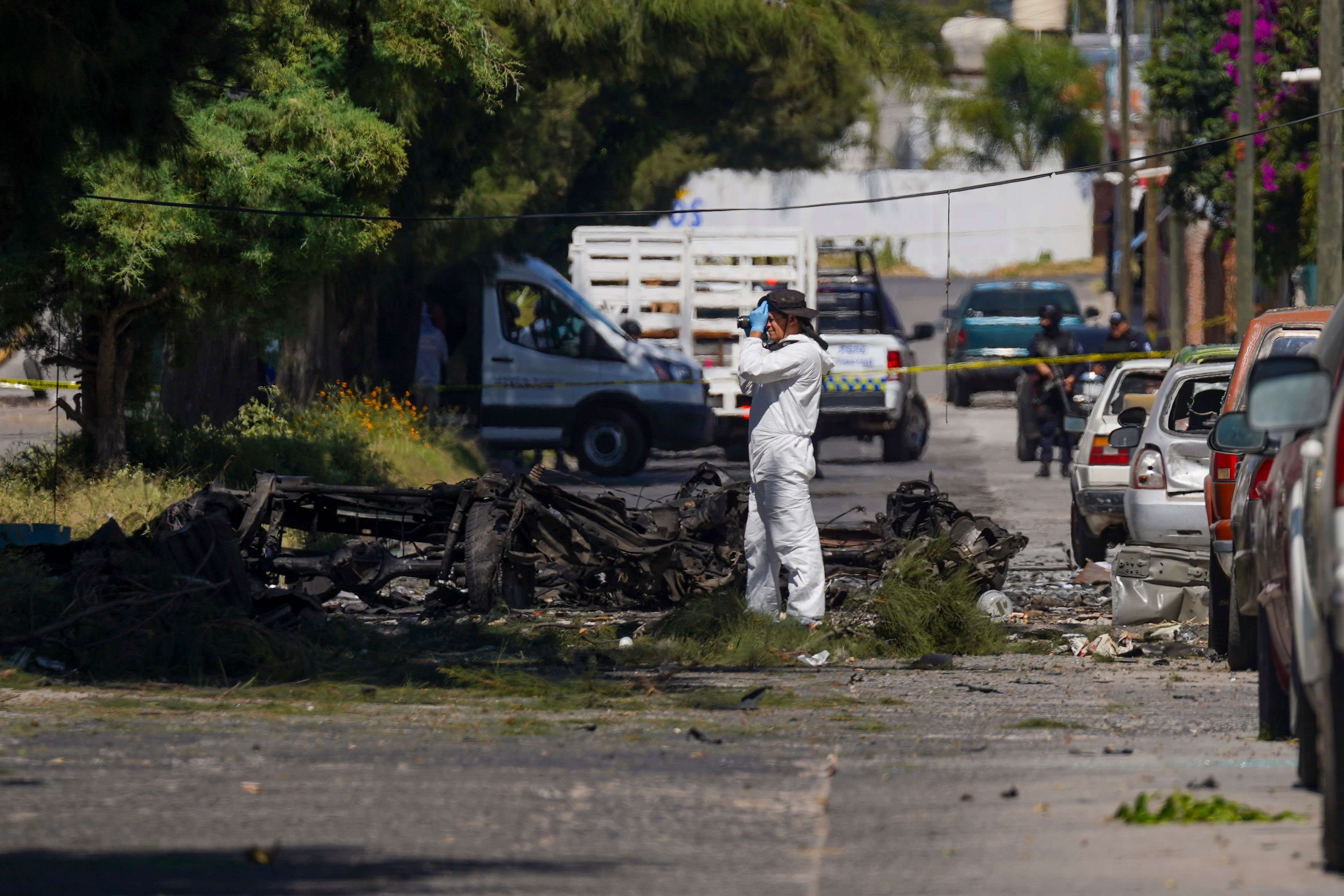A car bomb explodes outside a police station in western Mexico, wounding 3 officers
ACAMBARO, Mexico (AP) — A car bomb left outside a police station in the town of Acambaro in western Mexico wounded three people, prosecutors in the violence-wracked state of Guanajuato said Thursday.

A forensic investigator works the scene where a car bomb exploded near a police station, in Acambaro, Guanajuato state, Mexico, Thursday, Oct. 24, 2024. (AP Photo/Armando Solis)
They said another explosion, apparently a second car bomb, occurred in the nearby town of Jerecuaro. Although nobody was wounded, the force of that second blast was enough to blow the tile roof off a building, blacken the facades of surrounding stores and set alight a police patrol pickup truck.
The near-simultaneous attacks in two different towns located about a half-hour away from each other suggested the involvement of drug cartels that have been fighting bloody turf battles for years in Guanajuato.
Despite the violence, newly inaugurated President Claudia Sheinbaum pledged to continue the “hugs, not bullets” approach of her predecessor. Sheinbaum said Thursday she has ordered the army “not to have confrontations” with the cartels.
“We are not going to return to a war against the narcos,” Sheinbaum said.
But it takes two to tango, and her administration already appears to be locked in a war-like situation with the cartels in several states, whether she likes it or not, just three weeks after she took office.
The car bomb in Acambaro was sizable enough to toss parts of the burnt-out car across a tree-lined median strip in the street outside the police station, according to photos distributed by the municipal police.
The powerful blast apparently blew out the windows and doors of nearby homes.
It was the most serious car-bomb attack against authorities in Mexico since June 2023, when a cartel used a car bomb to kill a National Guard officer in the nearby city of Celaya.
In July 2023, a drug cartel in the neighboring state of Jalisco set off a coordinated series of seven roadway bombs that killed four police officers and two civilians. The improvised explosive devices, or IEDs, had apparently been planted in holes dug in the roadway.
The use of car bombs, improvised explosive devices and bomb-dropping drones illustrate the increasingly open, military-style challenge posed by the country’s drug cartels.
Sheinbaum has pledged to continue the policy of her predecessor and mentor, former president Andrés Manuel López Obrador, of avoiding confrontations with drug cartels. Before he left office on Sept. 30, López Obrador publicly appealed to the gangs to keep violence down, and offered training programs aimed at reducing the number of young recruits for the cartels.
The policy did not result in any significant reduction in Mexico’s historically high levels of homicides.
Sheinbaum faces a big surge in violence simultaneously in the northern state of Sinaloa, the southern state of Chiapas, and in Guanajuato, the state that has had the highest number of homicides in Mexico.
Sheinbaum, who took office Oct. 1, has said she will make reducing violence in Guanajuato a priority, and said the attacks Thursday were being investigated.
But David Saucedo, a security analyst based in Guanajuato, said the government has failed to recognize the scope of the problem. Sheinbaum and other officials almost always respond to the violence with stock phrases like “investigations are being carried out” or “the problem is being addressed.”
“In the federal and state governments, there is a resistance to talking about narco terrorism, because they think it will create a bad image for the country,” Saucedo said. “The truth is that Mexico already has a bad image regarding crime and violence.”
The problem is becoming more acute for the Mexican government, as drug cartels and violence in Mexico have become an issue in the upcoming U.S. presidential election.
“There are voices within the government who think that talking about narco terrorism would add fuel to conservative sectors in the United States who want to send the U.S. army to fight the cartels,” he said.
Saucedo said the Santa Rosa de Lima cartel — which has spent years fighting the Jalisco cartel for control of the state — is probably behind Thursday’s blasts.
“Although these attacks in Acambaro and Jerecuaro are part of a local (cartel) strategy, they are also intended as a message from the criminal gangs to the president and the governor, that they will continue in the battle and will continue fighting for Guanajuato,” he noted.
The attacks appeared to specifically target police offices or vehicles.
Officials are loath to acknowledge the war-like situation in some Mexican cities, because they can offer few solutions: their own policies have weakened local police forces and the government now relies almost exclusively on the military. That has brought predictable accusations of human rights abuses by soldiers.
Mexican army troops shot to death six migrants from at least four countries in the southern state of Chiapas on Oct. 1, the same day Sheinbaum took office.
Guanajuato state Gov. Libia Garcia said Thursday on social media that she had ordered a land and air search for the suspects, and wrote “our municipal governments are not alone, the entire force of the government is involved in the work to restore peace to Guanajuato.”
But only days before, officials fired the entire municipal force in the nearby city of Celaya, the city where more police have died fighting organized crime than any other in the nation.